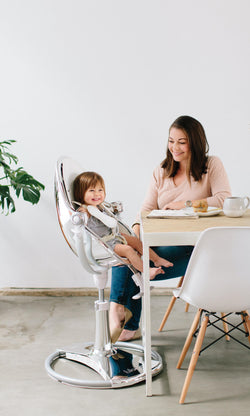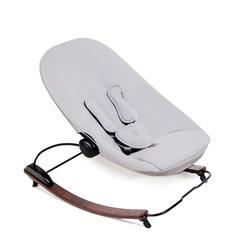
If you’ve ever Googled “how to get my baby to sleep”, you’re in good company. Every parent has been there. The endless nights, the bleary-eyed mornings, the double shot of espresso to get through the day. But you don’t have to run on fumes, and neither does your baby.
Here at bloom, we don’t just make (beautiful!) cribs: we help families create healthy and safe sleep habits that aid in your sleep routine...much like our friend and pediatric sleep consultant Hadley Seward. As the founder of Bonne Nuit Baby, a boutique sleep consultancy that demystifies sleep and helps families get more of it, Hadley has made it her life's work to make sure you -- and your baby -- get the sleep you need.
Bonne Nuit is based in New York City, but sees virtual clients worldwide, working to help them get more and better sleep in as quickly as two weeks. With more than 250-hours of training from the Family Sleep Institute (plus thousands of client hours!), Bonne Nuit’s consultant team can make what feels impossible actually happen for your household. We were lucky enough to snag some exclusive time with Hadley during our weekly breakfast with bloom on Instagram live, where she spilled the tea on her most asked questions about how to get a newborn to sleep.

How much sleep do newborns need -- and can they sleep too much during the day?
According to the National Sleep Foundation, newborns need up to 18 hours of sleep a day in the first couple of months. It sounds like a lot of sleep to us, Hadley said, but for a newborn it's the perfect amount.
“For newborns you really don’t have to worry about them getting too much sleep,” Hadley said. “Sleep begets sleep. I think the more that they’re sleeping during the day the more they’re going to sleep at night; they really are intertwined.”

How can both parents get involved with the bedtime routine?
Hadley says for long term sleep success, both parents should be involved in the bedtime routine from the very beginning -- though that involvement may look different depending on how you’re feeding your baby.
If the newborn is being exclusively breastfeed, bedtime often becomes a one-parent job, but Hadley says the co-parent can join in by taking charge at bath time and getting baby snuggled into pajamas before they nurse.
For bottle- or formula-fed babies, splitting bedtime duty looks a little different with parents alternating nights putting baby down.
“It is important as much as possible to have both parents involved in the bedtime routine, even if it isn’t possible every night for logistical reasons.” Hadley said. “I think it is important when it is possible so the baby gets used to having both parents there for the bedtime routine, because eventually the goal is that both parents should be able to put the child down equally as easily.”

When can my baby be on a sleep schedule?
For parents craving routine, Hadley says that will come in time, but for the first few months you’ll likely stay on your baby’s schedule. In fact, she says your baby won’t need to be on a schedule until between for or five months.
“For newborns you really want to focus on awake windows,” she said, referencing the time a baby is awake in between naps. “Figuring out your awake window is really important, it’s probably shorter than you expect it to be. A brand new baby can’t stay awake comfortably for more than 30 or 45 minutes. For the first month, they’re waking up to feed, get changed and go back to sleep again.”

How can I tell when my baby is tired?
For newborns there are three types of tired signs that vary from almost imperceptible to WOW OKAY this kid’s tired.
The first sign is so subtle there’s no doubt why many parents miss it. Your newborn will likely turn their head to the side to avoid stimulation.
The second type of tired sigh is a little more obvious, but if you're not looking you might miss it. This is when baby begins to yawn.
The third sign is something you definitely won’t miss and, Hadley says, unfortunately means you’ve missed the narrow window of getting your newborn to sleep happily. This is the over-tired, crying and rubbing their eyes stage. It means your baby has been awake longer than their awake window should have lasted.
“This is the sign that’s going to get your attention the most, but it actually means your baby is overtired,” Hadley said. “A lot of parents wait for the overtired signs not knowing that they actually mean your baby is overtired. When a baby is overtired, even a newborn, the baby is going to fight sleep. Essentially, it’s like they’ve gotten a shot of espresso.”
Even if you miss the mark for one sleep period, you can get on track for the next.
Hadley says putting your baby to bed between sign one and sign two is ideal, but that’s easier said than done. That’s why she swears by the awake window and says figuring your baby’s window out -- be it 30 minutes or an hour -- will make everyone so much happier.
Want more of Hadley’s tips? Watch our IGTV interview here.
Hanna Nakano is a Washington, D.C. based writer and photographer, and mother of two.







